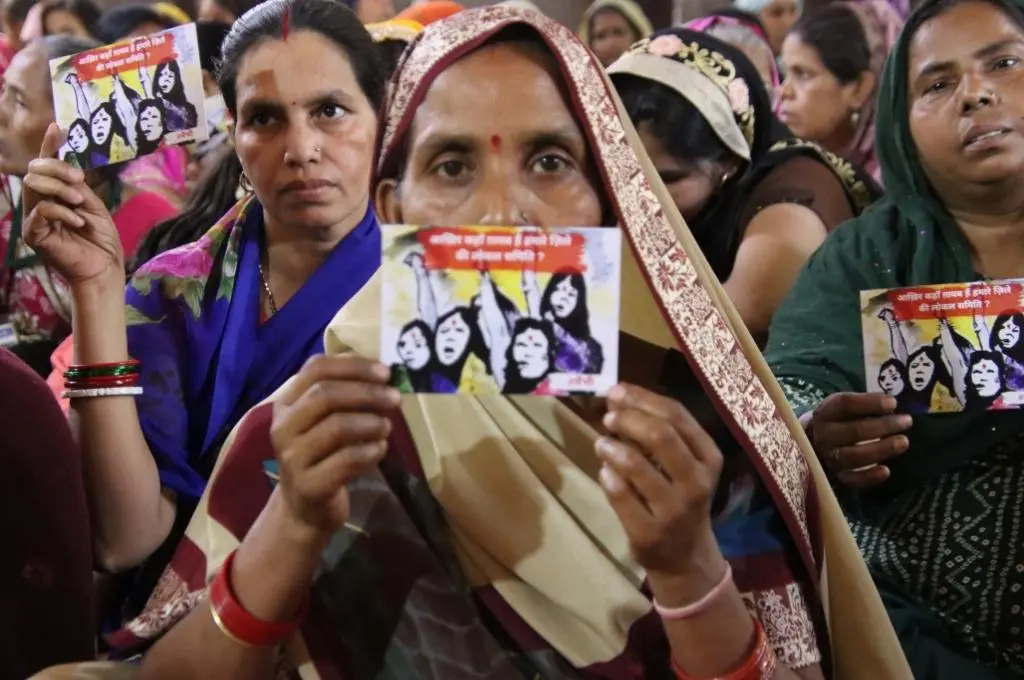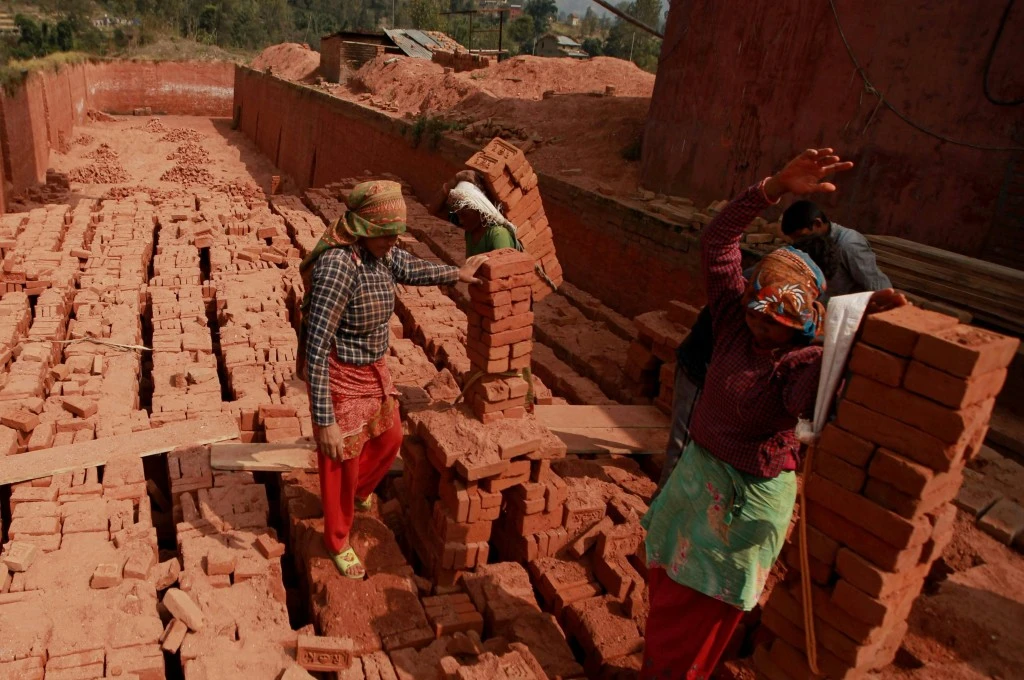Sexual harassment is often a normalised feature of work life for women domestic workers in India. For some, it begins at the gates of housing societies, where male security guards, gardeners, and car cleaners promise to help them find jobs in exchange for sexual favours. And it continues inside employers’ homes, where other forms of sexual manipulation come into effect. Marginalised by caste, religion, and poverty, these workers are unable to protest or reveal their experiences to families and coworkers for fear of disbelief, retribution, stigmatisation, or loss of livelihood. The severe power imbalance between employer and employee makes it almost impossible for them to report abuse, as complaints are invariably met with denial, accusations of lying, and outright dismissal.
To make matters worse, formal mechanisms for reporting such harassment remain scarce.
The Sexual Harassment of Women at Workplace (Prevention, Prohibition and Redressal) Act of 2013, or the POSH Act, is the only legal recourse available to women domestic workers for filing complaints and seeking redressal for workplace sexual harassment. However, the law falls deplorably short on implementation. Section 6(1) of the act, for instance, mandates the formation of local committees (LCs) in every district to help women file sexual harassment complaints with the police. Yet, enforcement has been inadequate.
A 2017 RTI filed by the Martha Farrell Foundation (MFF)—a nonprofit working to prevent gender-based violence in learning and working spaces—revealed that only 191 out of 655 districts had set up LCs.
However, whether these LCs are accessible to women domestic workers is questionable. This can be gauged from a December 2023 study involving 817 women domestic workers, wherein 96 percent said that it was difficult for them to reach out to the LCs in their districts. Some cited unclear office locations, while others pointed to the long distances they had to travel.
In the National Capital Region (NCR), the domestic workforce primarily consists of migrant women from Jharkhand, West Bengal, and Bihar, many of whom lack social security and support networks. These challenges are further exacerbated by the inaccessibility of the LCs.

Worker rights = workplace safety
It’s critical to understand that women domestic workers face heightened vulnerability compared to other informal workers, primarily due to the nature of their work and workplace. Women domestic workers are often denied use of the bathroom, access to drinking water, the right to sit on a chair, and fair and regular wages, depriving them of their basic human rights and constitutional freedoms. Their agency and dignity are systematically eroded, which widens the window for abuse. This also consolidates power for the employer, thus perpetuating the cycle of oppression.
Rendered increasingly powerless, women domestic workers are afraid to demand fair pay, leave, or better working conditions. When we at MFF began talking to domestic workers we found cases where someone received a wage increment of INR 800 after nine years of service. In other instances, the worker’s rights and benefits were made conditional on their compliance with employers’ sexual demands.
Additionally, their workspace is often a private home, closed off to public scrutiny and state regulation, which gives employers unchecked power. Domestic work is not regarded as a specialised skill but as an extension of women’s ‘natural’ household responsibilities. This is why people struggle to acknowledge women domestic workers as workers. This perception also fuels wage disparities. For instance, a male cook is viewed as a skilled worker, while a female cook is seen as doing what comes naturally to her.
The collective failure to recognise the house, housework, and the domestic worker within the formal framework of paid work, subject to specific rules and codes of engagement, heightens the risk of such work for women.
At labour rights forums for domestic workers, discussions focus on fair wages, leave, gratuity, and other forms of social protection, while sexual harassment remains unaddressed. Similarly, when we at MFF began talking to domestic workers about sexual harassment, we found that it was the least prioritised and the most normalised issue—driven by fear of job loss, stigma, and a lack of awareness about how it deepens their subjugation at work.
However, through solidarity and support, women realised that vulnerability to sexual harassment robs them of the moral strength and confidence to demand their constitutional and legal rights.
Building awareness through research and dialogue
In May 2021, with support from the UN Trust Fund, MFF initiated a project in Delhi, Faridabad, and Gurugram to raise awareness among women domestic workers about their rights under the POSH Act. The objective of the project was to improve access to redressal mechanisms while also strengthening the capacity of institutional stakeholders—such as LCs, nodal officers, and police personnel—to handle POSH complaints more sensitively and effectively.
Domestic workers reported male employers making them uncomfortable through unwanted physical contact or inappropriate requests.
The project was grounded in the principles of community-based participatory research, a methodology that engages stakeholders in identifying, analysing, and solving social problems. This approach empowered the women domestic workers to own the process of transformation and develop their own solutions. Over the course of the project, which continued until August 2024, we held numerous consultations and workshops with the women, local committee members, and other stakeholders working with them to achieve a closer understanding of the problem and collectively devise solutions.
At the beginning of the project, women domestic workers led a survey of1,939 peers to assess awareness of sexual harassment as a legal offence. Only 16 percent acknowledged that it was. However, they were uncomfortable talking about it, because it evoked shame, anger, and frustration at their inability to prevent harassment. “Why are you bringing this up?” they demanded. “It’s the way things are; nobody can change anything.”
Sexual violence is a taboo subject, rarely discussed. Therefore, it was important for the women to feel safe and supported when sharing these experiences—not just with us, but with other domestic workers as well.
Our strategy for collectivisation focused on organising multiple listening and learning circles. This builds trust and a sense of solidarity on the issue, encouraging them to open up in a safe environment and view each other as a part of a support group.
The issue of workplace safety was explored using various participatory methodologies and tools, including the Participatory Safety Audit. In this exercise, women mapped their communities and commutes, identifying safe and unsafe areas around their workplace. During discussions, they shared stories about people and situations that heightened risk both inside and outside their workplaces. Some reported male employers making them uncomfortable through unwanted physical contact or inappropriate requests. Others reported threats of sexual assault and rape. Some women faced harassment from employers’ teenage sons, while others felt uncomfortable due to intrusive questions or inappropriate behaviour from women employers.
Through multiple listening and learning circles, the women came to understand that what they had endured—whether at their workplaces or during their commutes—was not normal, but sexual harassment and a violation of their fundamental right to work with safety and dignity. However, this realisation also led them to seek accountability from the institutions, as the very mechanisms meant to support them were often dysfunctional, inaccessible, or too intimidating to navigate.
Agency to action: A roadmap
Faced with these barriers, the women began questioning the very systems meant to protect them. During one of the sessions, some asked,“What’s the point of learning about the law? When our district magistrate (DM) isn’t responsible enough to form the LC, how can we file a complaint?”
The participatory research approach ensured that the women themselves paved a path from problem to solution. Here’s how they did this.
1. Demanding accountability from authorities
Several women domestic workers proposed visiting their DM to demand why the LC hadn’t been formed yet. The women, along with MFF, then visited different districts in Delhi and urged other women domestic workers to join forces with them.
Residents, staff, and women domestic workers of a housing society participated in discussions on preventing sexual harassment and accessing effective redressal mechanisms.
Women leaders, or pehelkars, emerged as key advocates. They went door to door to explain the POSH Act to other women domestic workers and encourage them to sign demand cards. These demand cards asked the DM to provide information on their district’s LC and, if it wasn’t formed, to immediately establish it. Approximately 3,000 women domestic workers signed the cards, which were submitted to the DMs in Delhi and Haryana, where the project was active.
In Gurugram, after women domestic workers submitted their demand cards and advocated for their rights, district officials recommended that MFF work with Resident Welfare Associations (RWAs) to raise awareness about the POSH Act in housing societies. As a result, for the first time, residents, staff, and women domestic workers of a housing society in Gurugram participated in discussions on preventing sexual harassment and accessing effective redressal mechanisms.
In 2023, MFF filed a RTI in all 11 districts of Delhi to inquire about the status of the LCs to bolster the case with official data. This information was then made accessible to women domestic workers through community meetings, banners, and booklets across project locations. The information also empowered women domestic workers from North and South-West Delhi to hold meetings with LC members, discussing ways to make the POSH Act more effective for them.
2. Building awareness among employers
Alongside their advocacy efforts, women domestic workers also conducted campaigns with their employers, focusing on dignity and workplace safety. In the absence of laws to guarantee their workplace rights, the women demanded that employers honour their fundamental rights. To this end, they and created a charter of demands and gave it to their employers on International Domestic Workers’ Day. Written in Hindi and English, each demand was framed as a fundamental right and contextualised to their work environment. For instance, the right to equality meant an end to the practice of having domestic workers sit on the floor or serving them food in specially reserved utensils. Some of the employers dismissed the cards outright, but many accepted them.
Across various locations, women domestic workers are now organising collectively, supporting one another, and intervening in cases of salary disputes, discrimination, and harassment. In one instance, a group of 30 women from Jasola Vihar, Delhi, confronted the police and negotiated the rescue of two domestic workers from a violent employer who had forced them to work without proper food and water for more than a week.
3. Plugging gaps in the redressal system
Through multiple regional and state-level consultations, women domestic workers reviewed the POSH Act through their lived experience and also analysed the gaps that made the act inaccessible to them. Some of the recommendations are below:
- The district officer (DO) should ensure that every ward has a designated nodal officer who is accessible to any woman domestic worker who wishes to file a sexual harassment complaint with the LC.
- The DO should launch regular awareness campaigns on sexual harassment and redressal mechanisms for women domestic workers and employers through different mediums such as nukkad nataks (street plays); wall paintings at Anganwadi centres; and posters at one-stop centres, bus and metro stations, and other public spaces.
- DOs should display details such as names, contact details, and room numbers of LC members and the nodal officers in different public spaces including district offices, bus stations, and metro stations, as well as on district websites, in multiple languages.
- Women helpline numbers such as 181 and 1091 should make available information about DOs and LCs under the POSH Act.
- The DOs, LCs, and nodal officers should be trained on their responsibilities under the POSH Act as directed in the Supreme Court in Initiatives for Inclusion Foundation vs Union of India (2023).
- An ex-officio member of the LC can be designated with the task of coordinating with the police to ensure timely completion of an enquiry.
Systemic barriers continue to persist
While progress has been made on several fronts—such as collectivising and mobilising women domestic workers and operationalising LCs—some challenges persist.
Missing protocols: As the LC members are not permanent employees, they are not always present at the DO’s offices. This causes delays in reporting complaints. Moreover, the lack of clear protocols at the DO’s office further complicates matters. Without formal processes for submitting complaints, they sometimes fail to reach the relevant authorities, resulting in delays in justice.
Logistical challenges: Travel barriers pose a significant obstacle. The cost of travelling to the DO’s office, combined with the time lost, often results in women domestic workers forgoing the filing of complaints as they would lose out on daily wages.
Redressal concerns: The practice of forwarding complaints to the police under section 79 of the Bhartatiya Nyaya Sanhita, 2023 by the LC often exceeds the 90-day time limit under the POSH Act, further delaying redressal. Women domestic workers are also concerned about the confidentiality of their complaints to the police, being unsure about how their personal information will be handled.
Additionally, LCs face challenges in addressing complaints effectively. In Delhi, they often struggle with a lack of office space, delayed allowances, and insufficient training on the POSH Act, which makes it even more difficult for them to support women domestic workers in their pursuit of justice.
What began as a conversation about sexual harassment has evolved into a broader movement demanding workplace safety, dignity, fair working conditions, and labour rights. However, unless authorities take concrete steps to ensure proper implementation, awareness, and accessibility of redressal mechanisms, the POSH Act will remain an empty legal provision, failing to bring real change to the lives of the women working in the informal sector.
—






